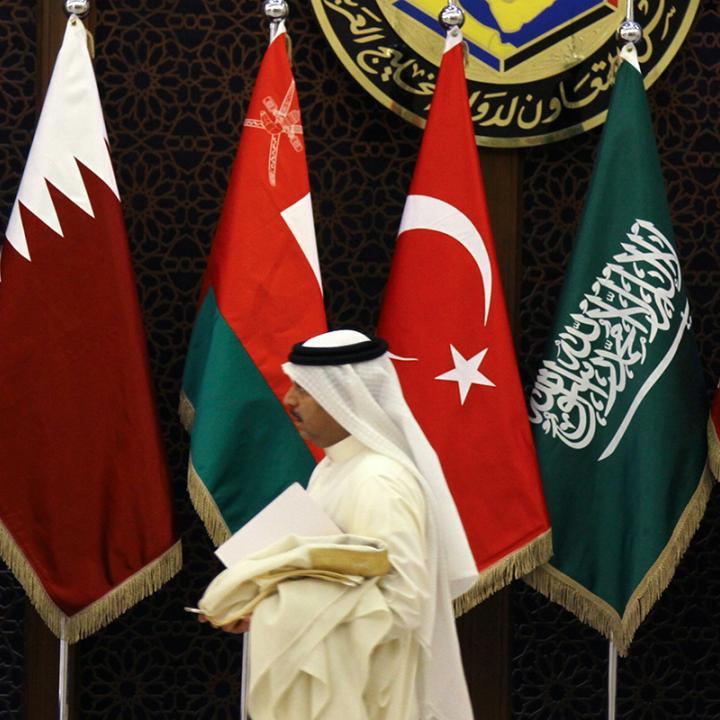
- Policy Analysis
- Policy Alert
Arab Gulf States Shift Toward More Harmonious Relations

After years of simmering tension, the recent evidence of positive change cannot be ignored.
For more than six years, relations between the Arab Gulf states have been defined by mutual antagonism. Bahrain, Kuwait, Oman, Qatar, Saudi Arabia, and the United Arab Emirates—all U.S. partners and members of the Gulf Cooperation Council—have been divided by interstate squabbles that undermined Washington’s efforts to address the growing terrorist and nuclear threat from Iran.
The main quarrel was Qatar’s rift with Bahrain, Egypt, Saudi Arabia, and the UAE, which erupted in mid-2017 when Doha was accused of supporting terrorism and Iran. In response, the other countries cut off diplomatic and commercial contacts—a ban that was not formally lifted until January 2021, when Saudi crown prince Muhammad bin Salman (aka MbS) apparently decided it had gone on too long. Yet Bahrain and the UAE retained a harsher view of Doha, and a cloud still hung over Gulf relations.
In the past two weeks, however, several developments have occurred that suggest things have improved radically. First, on January 18, the UAE’s President Muhammad bin Zayed hosted an informal meeting in Abu Dhabi with Bahrain’s King Hamad, Egypt’s President Abdul Fattah al-Sisi, Jordan’s King Abdullah, Oman’s Sultan Haitham, and Qatar’s Emir Tamim. Given Zayed’s stance on the Gulf rift, Tamim’s presence was astonishing. Also notable was the inclusion of Haitham, who has been a reluctant traveler much like his predecessor, Sultan Qaboos. MbS was absent, which may be significant as well—though just how is unclear at this point.
Then, on January 25, King Abdullah prefaced his trip to Canada and the United States with a flight to Qatar for dinner with Emir Tamim. The same day, Tamim spoke by phone with Bahrain’s Crown Prince Salman bin Hamad.
Two days later, Jordan’s Crown Prince Hussein bin Abdullah was seen on social media visiting a restaurant with MbS at the Saudi historic site al-Ula. Hussein is engaged to marry the daughter of a Saudi non-royal billionaire and seems to be his father’s agent in improving relations with Riyadh. The two princes were joined by Sheikh Theyazin bin Haitham, son of Oman’s sultan and the country’s de facto crown prince.
On January 29, the Bahraini, Jordanian, and Omani crown princes were in Riyadh to watch the Formula E electric car race with MbS, where they were joined by a smiling Emir Tamim. This was the Qatari leader’s first informal visit to the kingdom in several years, and is probably best explained as a response to the Saudi prince’s breakthrough visit to Doha last November for the opening ceremony of the World Cup.
Judging what exactly this onslaught of chummy meetings signifies is hard. As the old cliche suggests, there seem to be many moving parts.
One factor is probably dissatisfaction with Washington and its perceived lack of commitment to Gulf security. These states may have decided that local squabbles are no longer a luxury they can afford.
Another factor may be specific to Egypt and Jordan—namely, a desperate need to secure economic aid that is no longer guaranteed by Gulf oil producers, who are currently enjoying record revenues. At the annual World Economic Forum meeting in Davos earlier this month, Saudi finance minister Mohammed al-Jadaan stated that the kingdom was changing its policy of “no strings attached” aid.
For Washington, these developments challenge U.S. policy but also offer opportunities in terms of their apparent realism. Despite the ample diplomatic bandwidth currently being taken up by Iranian threats and the latest Israeli-Palestinian tensions, U.S. policymakers still have room to revitalize relations with the Gulf states. This is particularly true on the personal level (which is often so crucial in the region), but also in terms of reinforcing the reality of American commitment on a military level.
Simon Henderson is the Baker Fellow and director of the Bernstein Program on Gulf and Energy Policy at The Washington Institute.


